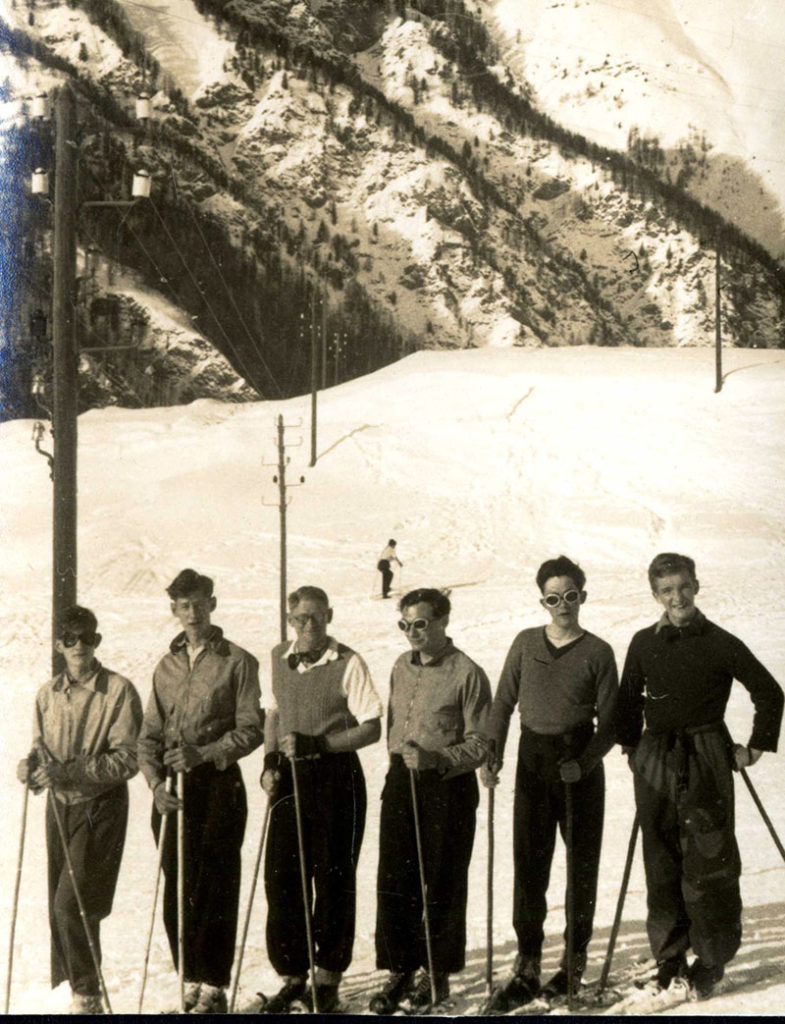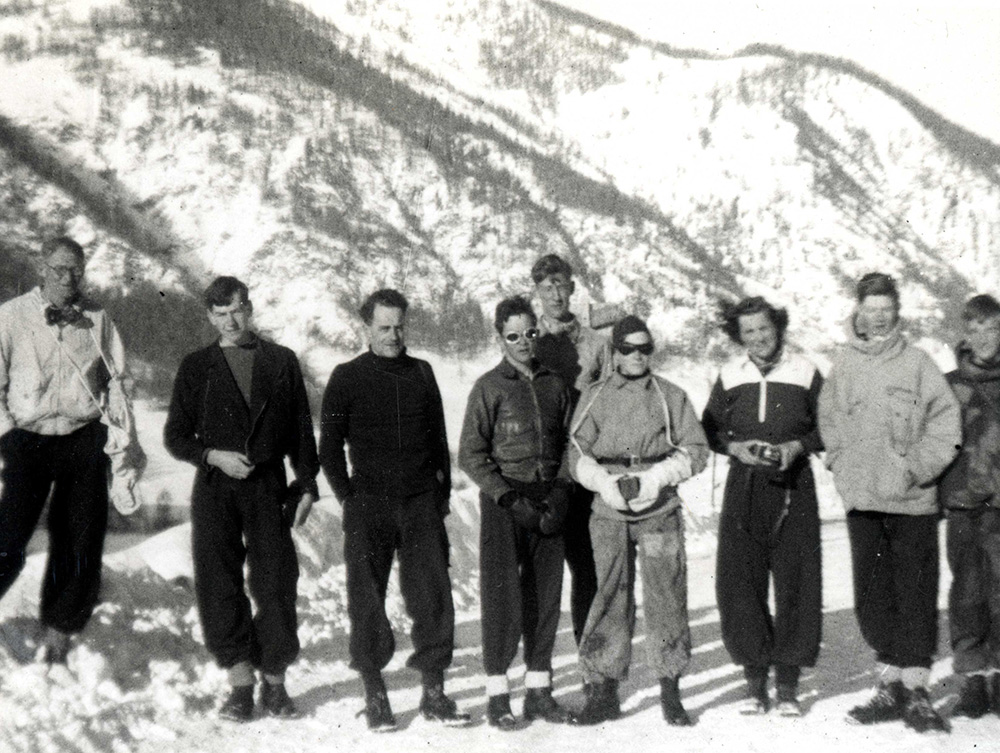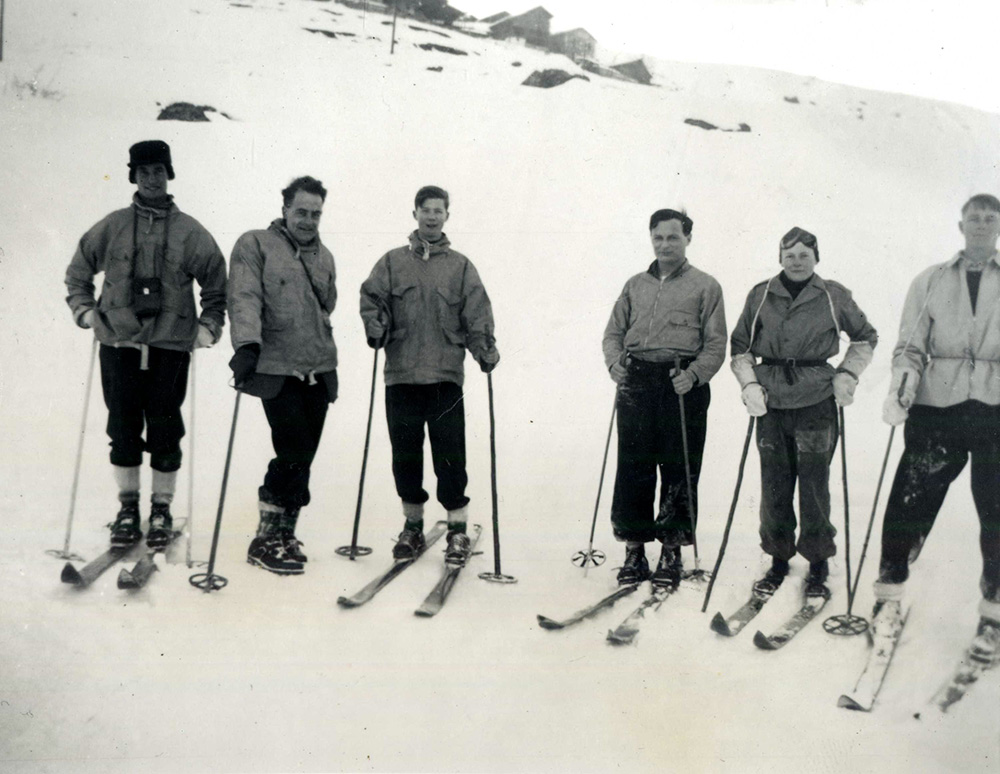Minor Sports
Except for boxing, which was to some extent compulsory, the minor sports at Wellington seem to have been much more relaxed than their major counterparts. Perhaps for this reason, our OWs tended to recall them with more enthusiasm and affection.
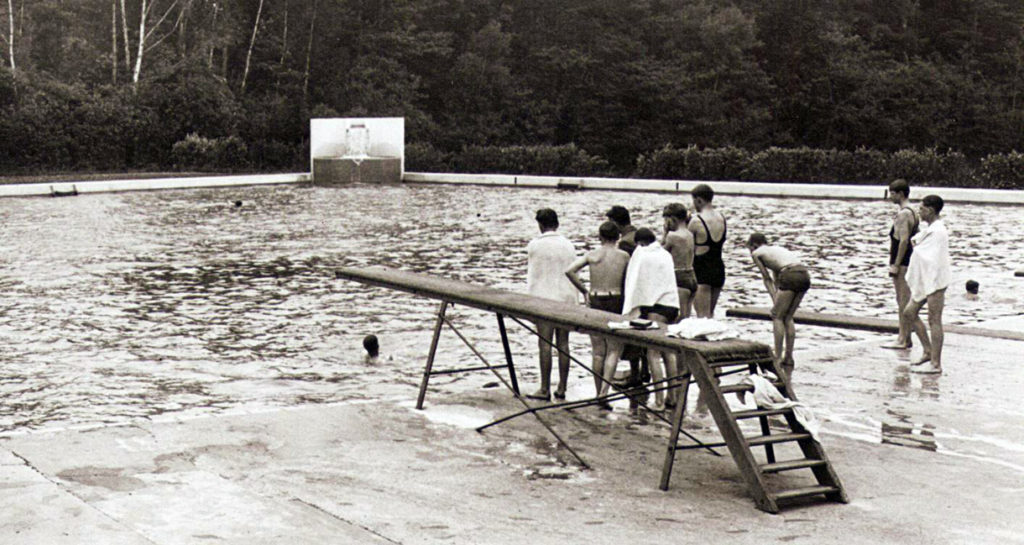
Tennis, squash, racquets and fives
Individual ball sports such as tennis, squash and their cousins do not appear to have been taken very seriously at 1950s Wellington. Many enjoyed them as social sports, removed from the pressure to do well which accompanied the major games, but some regretted that they were not encouraged more.
‘Although one could play tennis in one’s spare time, I always regretted that it was not pursued as an official sport.’ Peter Gardner (Hardinge 1946-51)
‘Eton fives was a popular game in wet weather. Tennis was an option, but it was regarded as a sissy’s game.’
Peter Davison (Beresford 1948-52)
‘…tennis, which was sadly very neglected, with appalling courts.’ William Young (Anglesey 1954-58)
‘My best game was tennis – but, as with golf, not encouraged because it was insufficiently “team”.’ Thomas Collett-White (Picton 1950-55)
‘I played quite a bit of tennis, being in the College’s 1st VI for my last two years. On that front, I played at Wimbledon in the Public Schools Championship, the Youll Cup, though if the truth be told, my partner and I fell at the first fence in the first round! Back at College, there were occasions when I and others in the tennis team were invited by the Master, Harry House, to play tennis with his sons and his daughter, Julia, on the grass court in the garden of the Master’s Lodge – a surface something of an improvement on the College courts, which consisted of rather worn-out tarmac!’ Colin Mackinnon (Hardinge 1951-56)
‘I was Head of Squash, Fives and Tennis. I am sad now to learn that the fives courts have been knocked down. It is a magnificent game with historic origins and taught you to use both arms with equal dexterity.’ John Watson (Benson 1946-51)
‘The escape from sport was fives.’
‘Bobby’ Baddeley (Picton 1948-52)
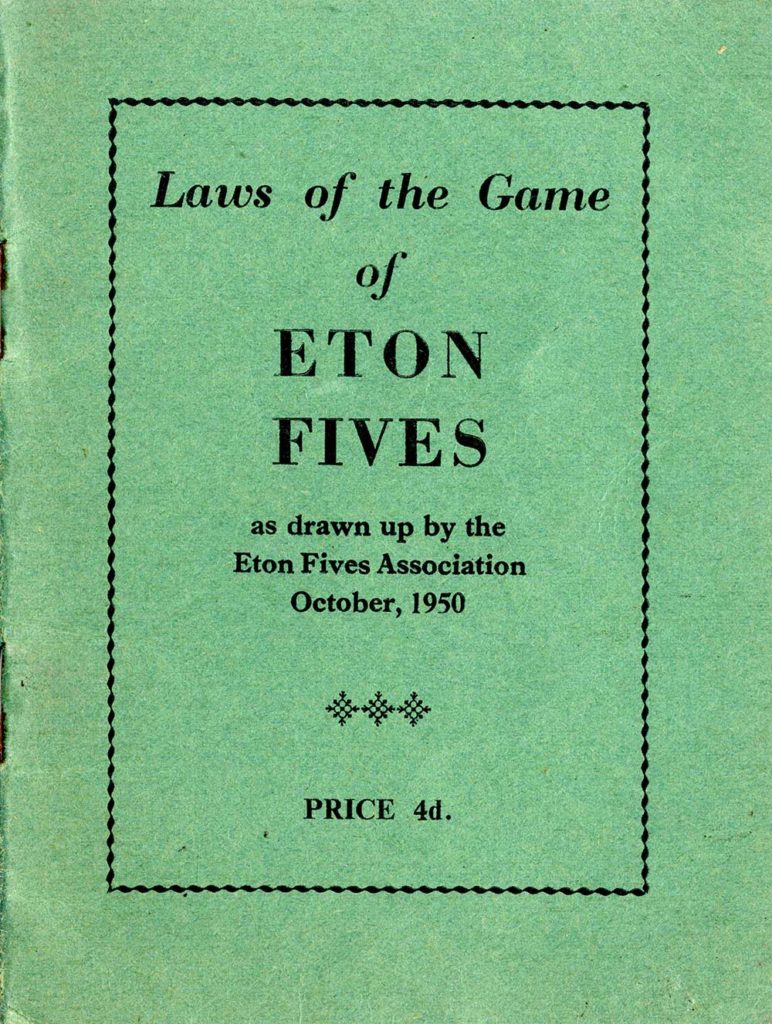
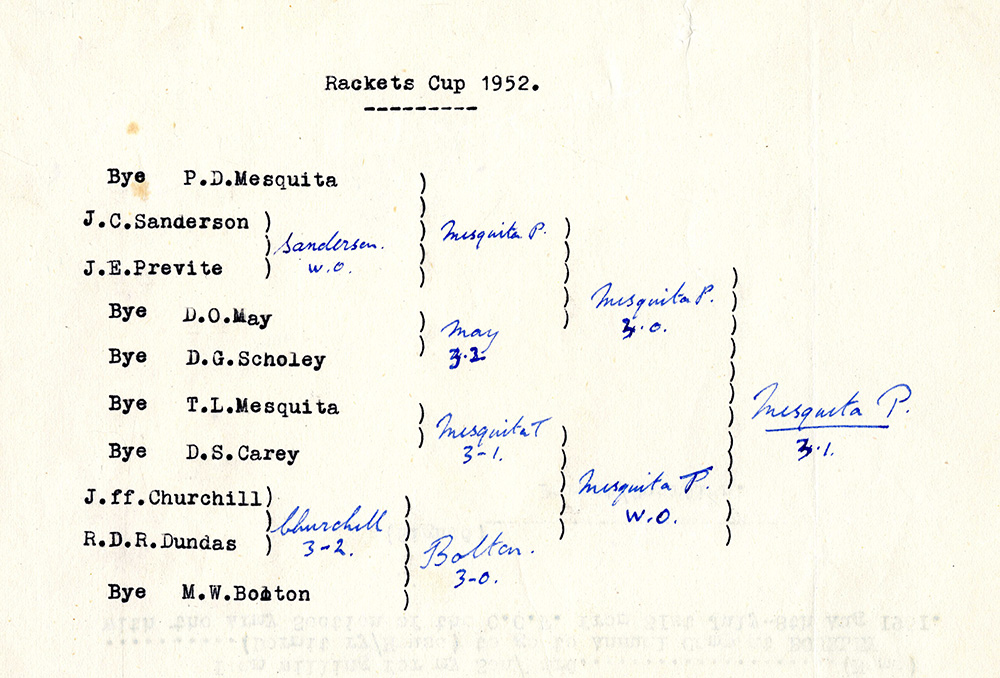
Racquets was more competitive, and may have been considered a major sport.
‘I played a lot of squash, and later took up racquets, the game which I grew to love the most, under the tuition of our “old-school” professional Ronnie Hawes. I managed to get into the Racquets VIII, but never into the pair since we had two outstanding players at the time, Bolton and Mesquita. I often wondered whether I could have got nearer their standard if I had been allowed to start the game at 13, as my father wanted me to do. However, my stuffy old Tutor, Claude Hughes-Games, refused to allow any of his charges to play rackets until they were 16, as he felt loose morals down at the racquets court might endanger anyone younger!’ Murray Glover (Anglesey 1947-51)
‘Because I was in the 1st racquets pair for four years (and I believe the only person ever to be so), my main sporting life was around racquets. Ronnie Hawes, the professional, was a most determined person and ruled like a rod of iron. We had to practise and train regularly, and in my final year we were totally unbeaten, then just before the Queens Championship I got mumps and could not play, so D G Scholey took my place and they did not win. Ronnie did not speak to me for three years, he was so disappointed. I loved playing racquets and it altered the course of my life.’ Mike Bolton (Hopetoun 1947-53)
‘I became Captain of Racquets, Squash and Tennis – mainly because, by chance, I was the most senior boy to participate regularly in these, rather than because of superior skill.’
Christopher Capron (Benson 1949-54)
‘Squash was a social sport for me, and was helpful in strengthening my right wrist after it was broken in a collapsed rugby scrum in 1958, followed by further damage to it when I had a bicycle accident outside the Picton.’ Tony Glyn-Jones (Picton 1954-59)
‘I also played Eton fives, partnered by Richard Persse, who was undoubtedly the best all-round sportsman in College at the time. We won the Fives Shield, and we also beat the pair from Eton, which gave us particular pleasure. I also played squash, and enjoyed watching the professional Jim Deare playing racquets.’ Robin Ballard (Orange 1955-59)
‘I developed a preference for squash and fives. These were only available infrequently when courts had been booked and one was not conscripted for a dormitory team.’
Richard May-Hill (Hopetoun 1957-61)
Douglas Miller (Benson 1951-56) wrote a long account of his involvement with racquets, slightly abridged here:
‘My number one sport was racquets, but I have carried throughout life a competitive urge not matched by natural talent. It was my misfortune to represent Wellington at a time when other major schools were exceptionally strong… A couple of years earlier David Dundas, the best player, received a ball to the back of the head that was close to life-threatening. He returned a year later and bravely resumed with Paddy Shillington as his partner just ahead of myself. Temperamentally, Paddy was better suited to the overall role, which involved keeping out of the way while David took the other side on single-handedly.
In my final year I should have been partnered by Ian Ritchie, an engaging rake from the Talbot. He was a left-hander, younger than me but a better player. It was a shattering blow when Ian lost an eye to a shot played by, of all people, Sandy Entwisle. I recall to this day breezing into the racquets court building unaware of what had happened while everyone else assumed I knew.
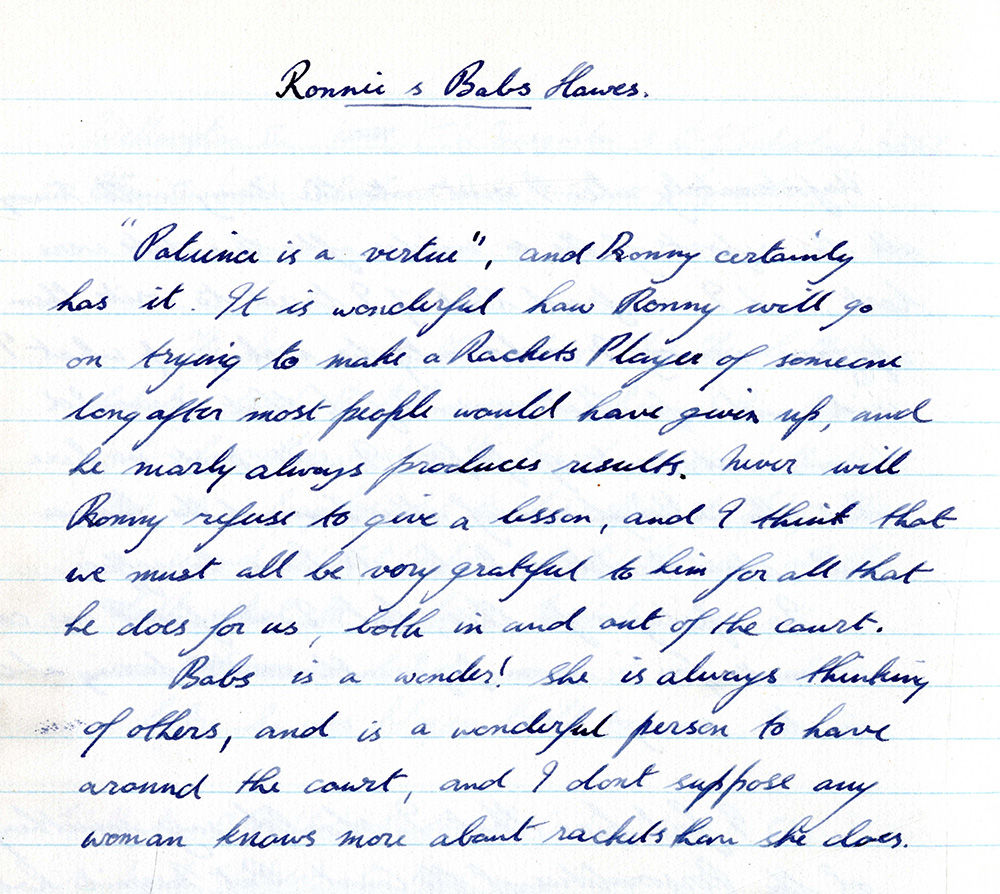
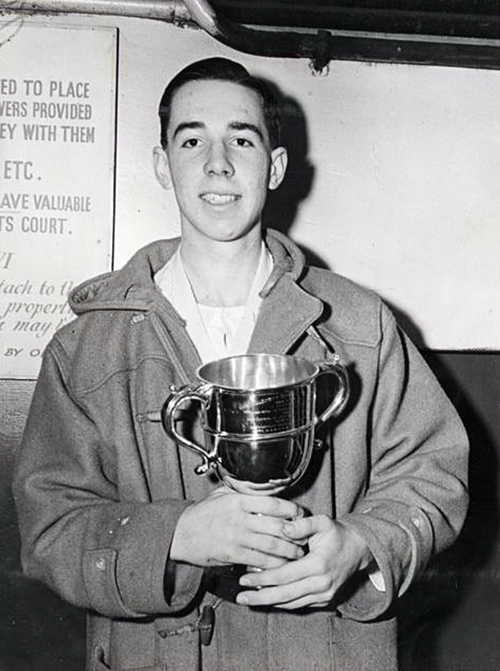
The game had struggled at College since the halcyon days of the de Mesquita brothers and Mike Bolton. It correctly had an image of being expensive – it cost my parents about £12 extra every term – and these accidents branded it dangerous. Losing heavily to every other major school did not help.
Clive Picton became my partner. Essentially a squash player, he was no more up to it than I was. I won the individual cup. For the final, Jack Wort arranged for most of the Talbot to cheer for Clive. I think I won more easily than expected, but my memory is much sharper of my semi-final. This was against Jonathan Edwardes, a Colt at the time but one to whom I had awarded colours as a member of the Rackets VIII, hoping thereby to encourage more young boys to take up the game. I led by a game and about 11-1. Oh dear, I thought, he is not justifying my faith in him. I let him have a few points. That was all he needed – I lost that game and was now in a rare battle. It got to 10-all in the fifth. “Who’s going to win?” someone asked Bob Giles. “I’ve no idea!” he replied. I got the serve back and five aces later, I had won. A few weeks later I stepped onto the court for the last time, at Queen’s, and we were trounced, probably by Charterhouse but I cannot remember.
Shane Chichester, who had been in the pair around the turn of the century, was still going strong in the 1950s and was a regular spectator at our school matches. He was still full of views, taking me onto the court to demonstrate his special undercut service. He also invited the first pair, possibly the second as well, to lunch at his home. After lunch, Shane showed us the (cricket) bowling machine he had designed and made. Such devices are now commonplace, but not then! Another of Chichester’s contributions to College was the gift of a heavyweight contraption that had apparently been used in earlier life to straighten out the wings of aircraft. It had been converted to press racquets balls into shape, extending their life at a time when we had no idea where replacements might come from.
I played a fair amount of squash and one or two games of fives, once representing College against an Old Westminster pair. I was partnered with Simon Clarke, who could play any game from roof cricket to ping pong. We soon got into the lead, and one of our opponents passed favourable comment on Simon’s play. These old boys had been playing for decades, so it was rather tactless of me to tell them that Simon had played for the first time the previous week.’
Gymnastics
Most Wellingtonians of the 1950s experienced the gymnasium, fondly known as the ‘PT Palace.’ Douglas Miller (Benson 1951-56) was not an enthusiast:
‘One quite pointless subject that remained on the curriculum throughout my time at College was PT… I recall some deep breathing and swinging one’s arms around to no obvious purpose ,with an occasional sortie onto the wall bars.’
But others enjoyed it:
‘The one exception to [my dislike of sport] was a love of gymnastics. Each Dormitory and House took part in a gymnastics competition each summer. I was a member of this team. I thoroughly enjoyed the challenge and I seem to remember we did well.’ Hugo White (Hardinge 1944-48)
‘Under the excellent tutelage of the PT master, Mr Meikle, I was fortunate enough to win the top award for gymnastics every year I was at Wellington. I believe this record has never been repeated.’ Peter Rickards (Murray 1947-52)
‘Being a keen gymnast, I felt gymnastics at Wellington was poorly regarded and poorly taught. This lasted until my final year, when a vibrant, no-nonsense Army officer named Penfold replaced Gowie as the instructor. For some reason, I was made Head of the Gym, a misnomer involving no more than allocating space in the gym building.’ Peter Gardner (Hardinge 1946-51)
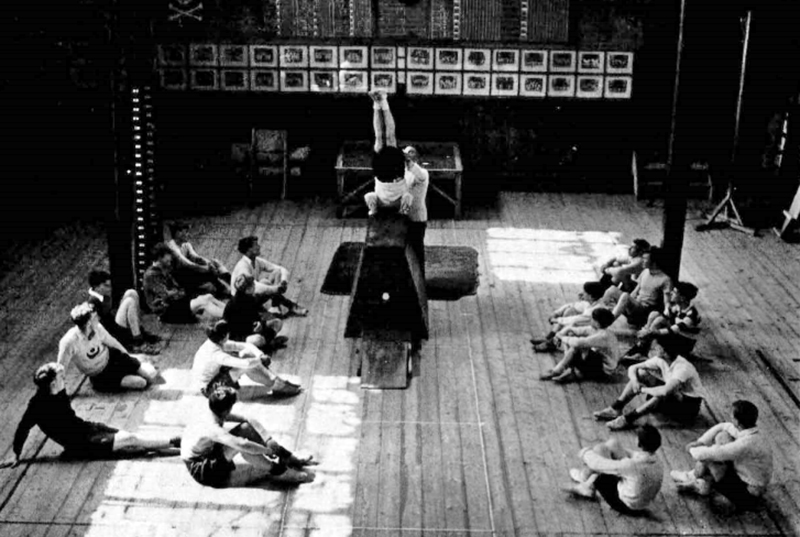
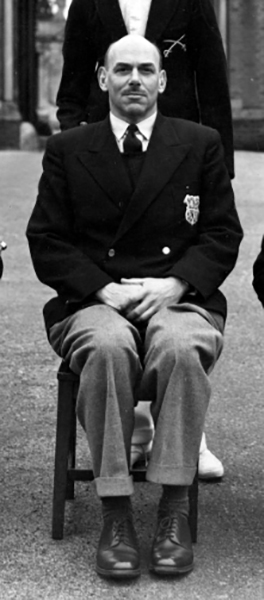
Other respondents also remembered Colonel Penfold:
‘He had the fruitiest voice on the staff, with the possible exception of Crawley. Away from the gym, he looked a lost soul. In the gym he was never fit, for ever apologising for his inability to demonstrate some exercise. “My bee-ack!” was always his excuse. Douglas Miller (Benson 1951-56)
‘Colonel Penfold was the delightful gym teacher, a jolly, blustery old fellow with a bald head. In one class, he was demonstrating how to hang upside down on the climbing bars when the bar he was clutching broke, and he fell a couple of feet directly onto the top of his shiny pate. We watched in dread, but he quickly arose with a bright red face, shook his head and bellowed, “I’m all right! I’m all right!” Years later, I encountered Colonel Penfold on the beach at Lyme Regis where he was the much-loved deckchair man.’ Thomas Courtenay-Clack (Hardinge 1954-59)
Douglas Miller recalled:
‘Penfold was assisted by a man named Chapman, and I quake as I recall how little respect we paid him. Unsavoury class distinction was rife throughout society, and Chapman came from the other side of the divide. He was entitled to be addressed as “Sir,” and reasonably enough he expected this, but there was an unruly element, a minority determined to deny him the pleasure. His most favoured phrase was not far wide of the mark: “It’s just low mentality.”‘
An anonymous OW had better memories:
‘I enjoyed boxing under the splendid Sergeant Chapman, an ex-Army PTI who had taken us for PT and boxing at our prep school. When we got boisterous, which I am sorry to say was rather frequently, Chapman would always say: “Gentlemen, gentlemen, never let your enthusiasm override your personal control.” The dear man could never recognise the difference between enthusiasm and devilment. He had the word “Sally” tattooed on his forearm, and tried to tell us it meant “sally forth” and not a girl’s name!’
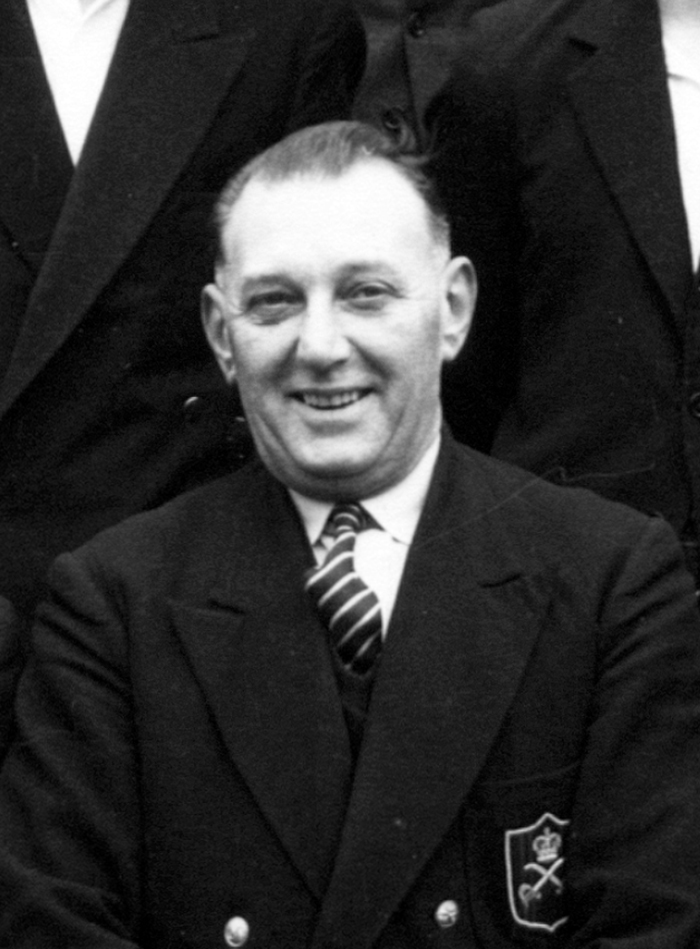
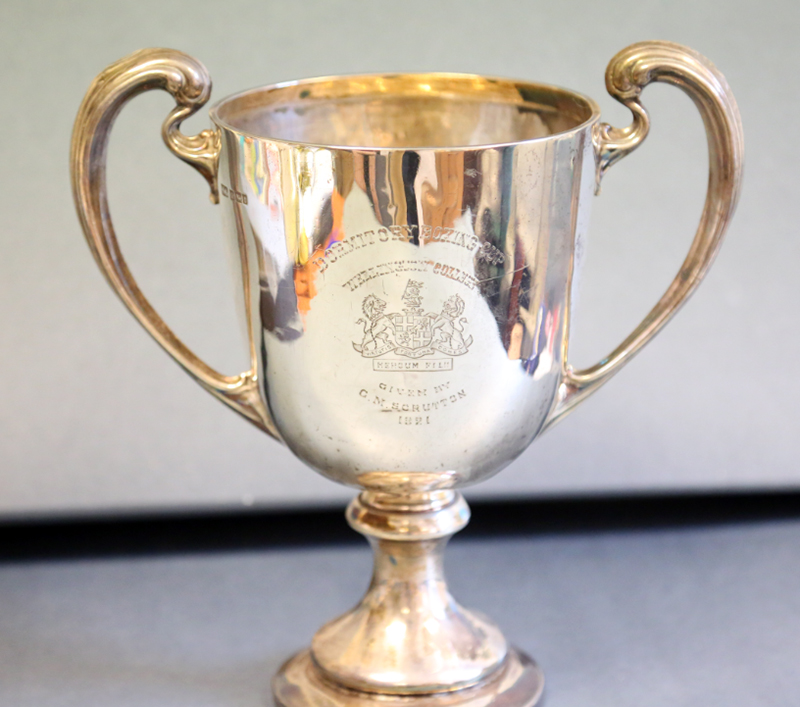
Boxing
In the 1950s the tradition of the ‘New Men’s Boxing Competition,’ in which all new 3rd Formers had to take part, was still strong. For many, this was their first and last experience of the sport:
‘Perhaps my arrival as a new boy – the smallest among 600+ – wasn’t too propitious! I was entered for the “New Men’s Boxing” competition – with only three of us in the smallest weight. I got a bye to the final and was duly thrashed. Still, I can always have on my CV “Made the final of the boxing.”’ Thomas Collett-White (Picton 1950-55)
‘In my first term, I won the flyweight boxing title. I was extremely fortunate because I was due to fight John Boguchwalski, who I suspect would have been the favourite, in the final, but he was unwell, and | got a walkover. That marked the end of my boxing career.’ Robin Ballard (Orange 1955-59)
Many did not relish their boxing experience:
‘I remember boxing in the old Gym, representing the Benson in an inter-House competition. I cannot say I enjoyed it.’ Anthony Bruce (Benson 1951-56)
‘Your opponent was picked for you: someone the same height, usually twice as wide. You could never win, so reducing the number of times you were knocked down was the best tactic. I enjoyed all sports except boxing.’
Peter Davison (Beresford 1948-52)
‘I was put in to represent the Anglesey in the inter-Dormitory championship, and came up against a College boxing team member, Geoffrey de Bellaigue. I remember him hitting me on my Adam’s apple, causing me to give a loud squawk, and all his supporters shouting “Finish him off!”’ Murray Glover (Anglesey 1947-51)
‘I think this was an erroneous scheme, as anyone can see that a trained boxer can hit an untrained enthusiast at will. Being tall and fairly strong, I was unfortunately paired off with the College heavyweight champion, Douglas. He was quite merciful, but eventually ended the unequal contest with a punch on the jaw, which removed a large chip from my front tooth.’ Nikolai Tolstoy-Miloslavsky (Stanley 1949-53)
‘I continued to box when I arrived in 1954, but enjoyed it less and less as my opponents and I got heavier and inflicted more damage on each other. After a couple of years, I decided to fight in one more school competition. Luckily I won my weight, thanking my lucky stars that I wasn’t in the next weight up where I would have faced a formidable opponent, much stronger than me, who went on to join the SAS. His fight was stopped in the first round as he demolished his opponent.’ Anthony Goodenough (Stanley 1954-59)
Others chose to continue boxing, and enjoyed it, although they do not shirk from describing the violence:
‘I won the welterweight class in the school boxing competition. I fought a boy called de Pass and broke his nose; even today I recall the horrific sight of his bloodied face. He never spoke to me again. That year I fought – and was well beaten – by a boy called Taafe from our London Mission which visited the College for a fortnight in the summer holiday, enjoyed our hospitality, grounds and food, and demonstrated their gratitude by pulverising, one by one, the ad hoc boxing team scraped together by College for their entertainment. In fact, Taafe was a smashing boy. Shortly after, I beat a boy from St Paul’s School [evacuated to Crowthorne and its environs]. Their performance in rugger and athletics was laughable, but their boxing team was quite outstanding, so my win was most unusual.
I boxed for the school whenever it fielded a team. Boxing at Wellington was very much a minor sport, and no one master was appointed to supervise it. However, it was becoming more popular and some excellent boxers came on the scene. We took part in a four-sided match with Bradfield, Charterhouse and Beaumont and came second – but I was the only Wellingtonian to win both my fights, and the welterweight class. Soon after this, Wellington held its own annual competition and I was amazed to be soundly beaten by a rugged newcomer, a ginger boy called David Stevens. He refused to succumb to my devastating right hook and deployed his own more efficiently!
My boxing career at Wellington ended in farce. St Paul’s returned to London after spending the war billeted in Crowthorne, and set about improving its already awesome team. We accepted, unwisely, to fight them in London, knowing we were no match for them in the ring. Although no longer first string welter, I was dismayed to find, on arrival, that I was to fight Madath, whom I had met a few months previously. As predicted, we had lost most of the bouts by the time mine came up. I paced myself and having given my all in the three-round contest, I was spent. The referee announced a draw. But before I could struggle through the ropes and escape, Graham Meikle, the usher accompanying us, asked me to clear up the situation by fighting a fourth round. I agreed, a decision at which I have marvelled, and rued, all my life. Of course, I lost! Our team felt Meikle had sold them and me down the river, and our coach trip back to Wellington was silent with resentment.’ Robert Waight (Orange 1942-46)
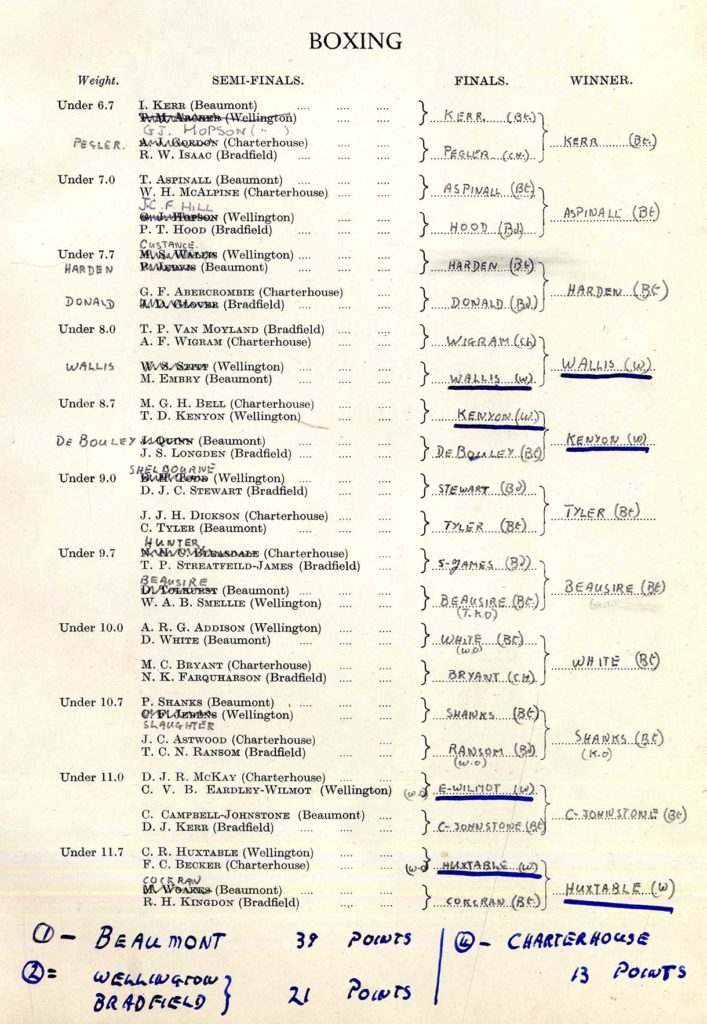
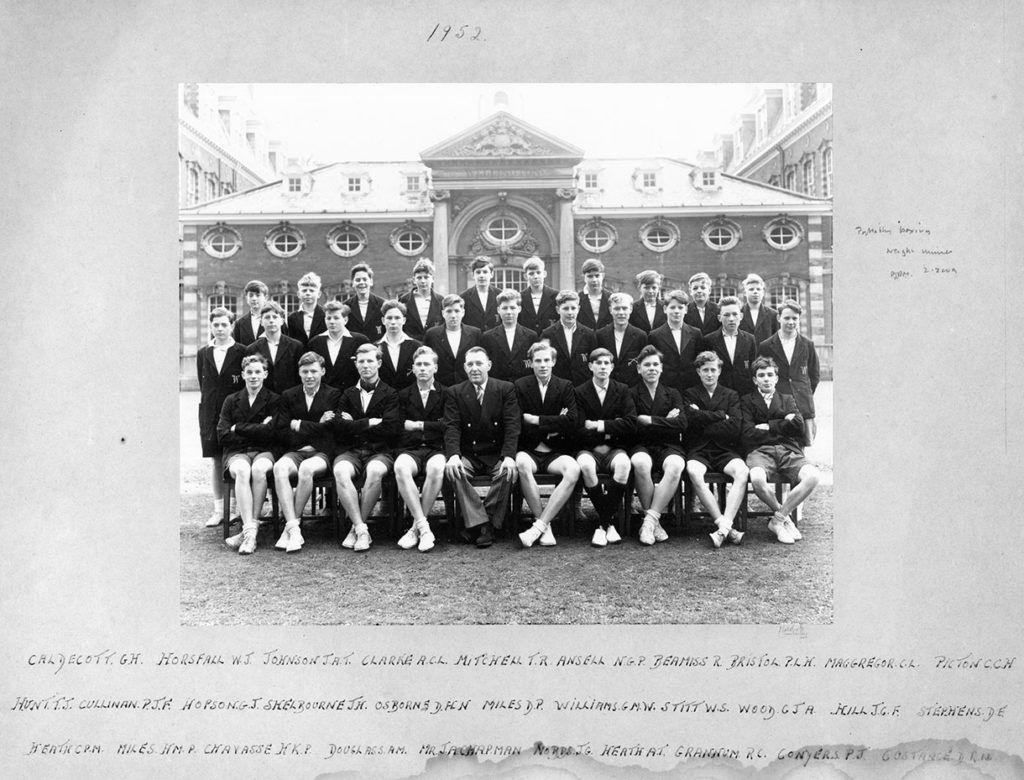
‘I had been taught to box at the crammer, so opted for that as my sport and took it seriously, getting fit. I liked the PT Instructor and soon got into the Boxing VIII, and my colours. When I announced my intention to leave after O-levels, I was offered the captaincy. The downsides of boxing were “nerves” before a fight, lack of concentration after a hard fight, and a broken nose which is still troublesome some 65 years later.’
Randal Stewart (Anglesey 1953-56)
‘I boxed for College a few times but lost all four fights. My brother also boxed. About 60 years later, I met a man who had been in the Beresford with me but was younger. While chatting about the past, he told me that both my brother and I were regarded as being very tough. I am pretty sure that we were never bullied at Wellington because of our boxing reputations. This might have been helped by the fact that I knocked out one of my College opponents.’ Chris Heath (Beresford 1948-53)
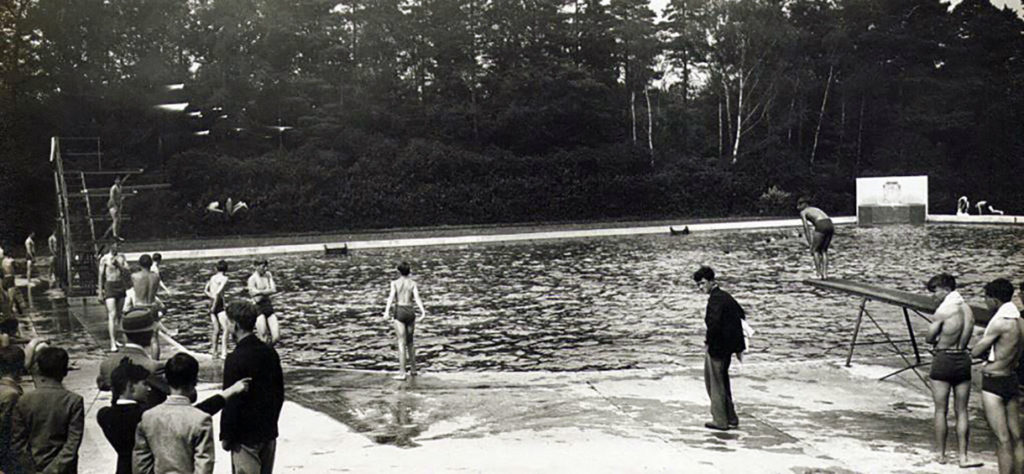
Swimming
A ‘general bathe’ in the outdoor pool was enjoyed by all as a leisure activity, but some boys swam competitively. One recalls that they may have had an unfair advantage:
‘It was Mr Crowe whom Wellington had to thank for the success of its swimming team. As the starter, stopwatch in hand, he would line the teams up and in his deep voice say, “I will say ‘On your marks, get set, go,’” followed immediately in the same breath with “On your marks, get set, go!” Our team were prepared for this and were away in a flash, while the opposition floundered.’ Pat Stacpoole (Combermere 1944-48)
‘I swam whenever could, both recreationally and competitively. I never learned the crawl but was better than most at the breaststroke, representing the swimming team for a couple of years and becoming Captain for my last term.’ Peter Gardner (Hardinge 1946-51)
‘I represented Wellington in the Swimming VIII from my first year. We began training at the beginning of the Summer term. One year when we started training, the water temperature was 58 Fahrenheit [14.5 degrees Celsius]. By today’s standards, nobody could meaningfully train at that temperature.’
Roger Ryall (Picton 1951-56)
‘I could swim breaststroke rather quickly, so ended up representing College occasionally, even at other schools, which I found quite stressful. One memory is of an American student, Bob Semple, who joined us in the Picton for a year. We were aware that he was the American Junior Freestyle champion, so waited with great expectation to see how he performed at the beginning of the summer term when the pool was opened up. It was no surprise to us when he completed his first few lengths at great speed and succeeded later in knocking a few seconds off the College records for distances in crawl, back and butterfly/breaststroke as far as I can recollect. We thought that this could be accounted for because the temperature of the pool was so low, one needed to get out of the pool before hypothermia set in, especially if you came from the much warmer climate in the States!’ Tony Glyn-Jones (Picton 1954-59)
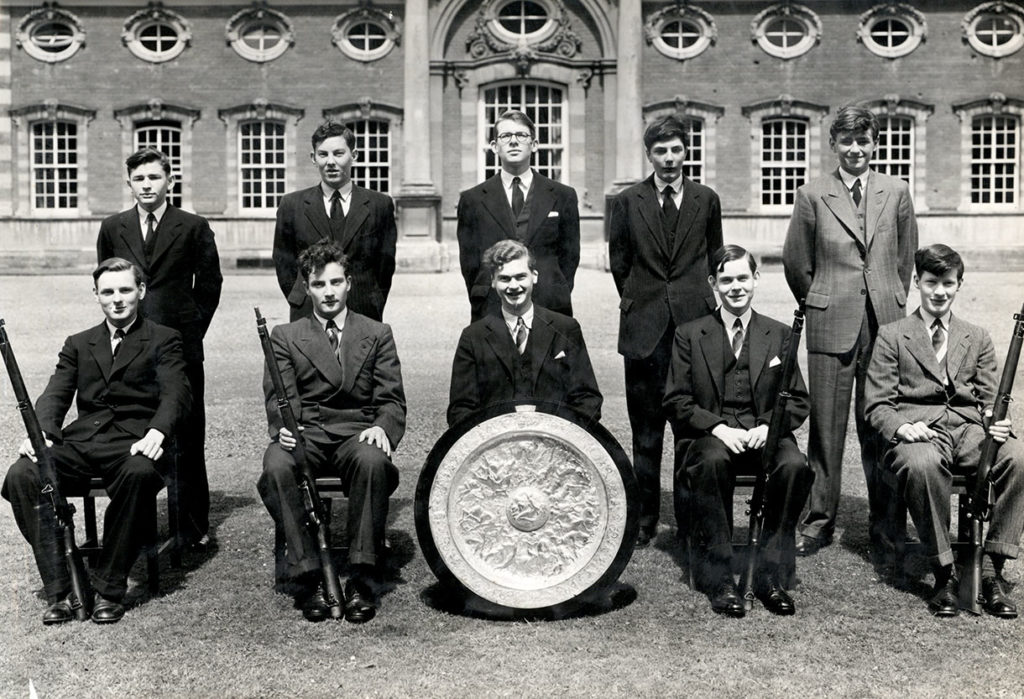
Shooting
Several respondents enjoyed competitive shooting at Wellington, appreciating the good facilities and the other benefits offered by the sport:
‘I was a member of the shooting team on the miniature range and, for my last year or so, we also used the open range which was brought back into use towards the end of the War. I really enjoyed this.’ Richard Buckley (Combermere 1941-45)
‘I was in the Shooting VIII. We used army .303 rifles but with better sights. We only had a 200-yard range at Wellington, but went to Bisley for competitions where they had a 500-yard one.’
Nigel Gripper (Hopetoun 1945-49)
‘I chose to specialise in rifle shooting, participating in the national Bisley rifle meeting in my last three years and gaining my College Colours. Bisley was an enjoyable break from studies, as one could enter various competitions where the prize money was tempting.’ Alan Munro (Talbot 1948-53)
‘There was plenty of opportunity for target shooting at Wellington: there was an enclosed small arms range near the PT Palace for .22 rifle shooting, and a full-scale outdoor range for .303 with short- and long-range firing points and serviced butts.’ Anonymous
‘As it was not possible to devote the time to shoot for College in the summer, I concentrated on small-bore shooting in the winter months. I had been taught to shoot by the winner of the Queen’s Medal at Bisley, so I was able to represent Wellington with success, being awarded my Minor Sports colours.’ Tony Glyn-Jones (Picton 1954-59)
‘What a great sport, where you exercise your skills lying flat on your belly! I had always been a good shot and this was a natural for me, so I earned my school Colours and a cool tie. The school ranges were in a fairly remote part of the woods, and warning flags were put up on the bicycle paths that crossed them. One afternoon, as I was training my sights on the bullseye 500 yards away and about to pull the trigger, an elderly gentleman pedalled slowly in front of the target. It was a very close call. Another scary moment was when we were wrapping up at the end of the day, lined up with our rifles in “port arms” position and proceeded to clear the magazine by exercising the bolts seven times to ensure there were no bullets in there. One fellow lost count and only did six, pulled the trigger and nearly blew the head off the boy next to him. The only damage was total deafness and ringing ears for several hours.” Thomas Courtenay-Clack (Hardinge 1954-59)
‘I enjoyed shooting since it meant trips to the RMA and Bisley ranges. Dick Gould was Shooting Master and was a likeable man. I recall (illegally) drinking half pints of brown ale in the Honourable Artillery Company clubhouse at Bisley, long before Wellington College purchased the Inns of Court Club. We travelled by ancient coach from College, with a driver who was a WW1 veteran.’ Stuart Dowding (Talbot 1957-61

Golf
Another recognised minor sport was golf; several respondents enjoyed playing, and David Nalder (Orange 1949-53) was eventually Captain of Golf:
‘Even when fourteen or so, I used to visit the East Berks on summer Sundays, and after the game my pals and I would have tea there with scones and cake etc., all for a shilling and ninepence. Then we would cycle back to College for supper!’
Sailing
For some, sailing was a leisure activity (see ‘Clubs and Societies’), but others mentioned sailing competitively:
‘I loved sailing on the Thames at Reading in “Wellington 1 Designs,” clinker-built 10’ 6” dinghies with mainsail and jib. We cycled the 14 miles each way, either alone, or with Peter Comber; all a bit spartan. Sailing was launched and run by Peter Comber with help from ROI Borradaile. We had matches against Charterhouse on Frensham Pond. I became Captain of Sailing.’ Tim Reeder (Picton 1949-53)
‘Peter Comber designed a Wellington dinghy – I think 12 foot. It was a tub, but he also had a very heavy old Cadet which he lent to my brother Jonathan and me for the 1951 International Cadet Championships at Burnham. In spite of its weight, it was quicker in light winds than heavy, and at the end of the week we finished 19th in an international fleet of 53 boats. That included sailing without our bungs in one race and, as we realised the problem, we saw Peter Comber pursuing us on foot along the Crouch riverbank. In spite of being a Chindit in Burma, he carried some weight! We got to the shore without sinking, put in the bungs and rejoined the race. The really interesting part of the week was that the great Peter Scott was there and gave fascinating lectures. Also, we met girls without parents for the first time, as many of the foreign crews were female. We used to sail by the gasworks at Reading – you could certainly smell the gas. To get there – eleven miles – we were allowed bikes, and used to call in at a pub on the way back. Arnold Potter – a lovely chap – used to drive us to sailing matches in his 1920s Rolls Royce: what a car. We used to sail against Sandhurst in their National 12s and Charterhouse in Cadets on Frensham Pond.’ Bertram Rope (Picton 1949-54)
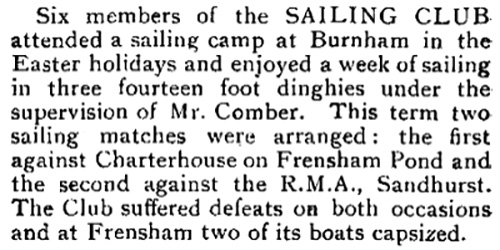
Soccer
Soccer was not a recognised sport at Wellington in the 1950s, and some recalled how it was looked down upon:
‘Football, which we referred to dismissively, and perhaps a little arrogantly, as “oikball,” was neither played nor discussed.’ Anonymous
‘Soccer, which was not played at College, was referred to as “the round ball game,” and was frowned upon.’
Robin Ballard (Orange 1955-59)
Randal Stewart (Anglesey 1953-56) commented that he had ‘played soccer at prep school, so I took a while to understand rugby.’ Others like him retained a fondness for the game, meaning it was sometimes played informally:
‘I enjoyed playing soccer on Sundays on the pitch next to the Armoury. The team arrangements were pretty informal – it was most enjoyable!’ Jeremy Watkins (Blücher 1951-55)
‘Soccer was then just in its infancy at College, under (I think) Mr Haslam.’ Jerry Yeoman (Anglesey 1955-59)
Skiing
Lastly, some students recalled how Wellington introduced them to the then-exotic sport of skiing:
‘I had a memorable skiing holiday in a school group to St Veran, led by Pip Letts. One of the best holidays I can remember.’
Bryan Stevens (Blücher 1948-52)
‘It was during the Christmas holidays in 1956 that I first put skis on: a party from College, under the guidance of Pip Letts, Tutor of the Anglesey, went to a small village near Lech in Austria and stayed in a small family hotel. There were no ski lifts there, and we used to spend the morning walking uphill with skins on our skis, then a packed lunch at the top and a fairly rapid run downhill in the afternoon. We had an excellent guide with us, and by the end of the two weeks were all fitter than we had ever been or were likely to be.’ Colin Mackinnon (Hardinge 1951-56)
